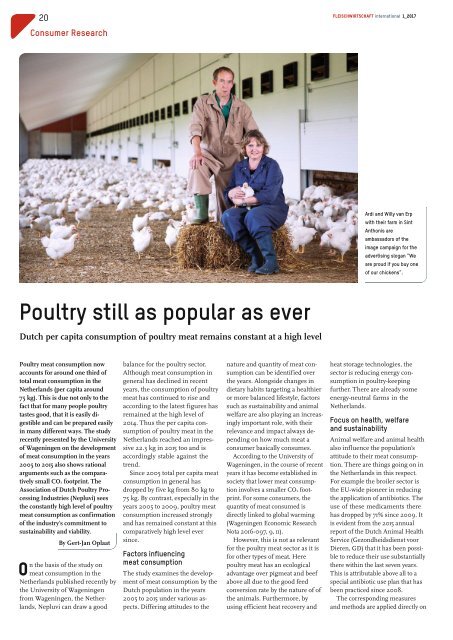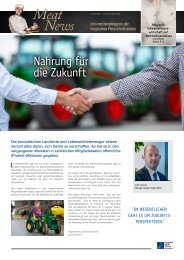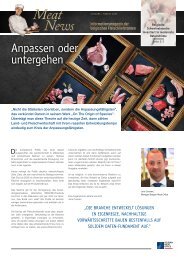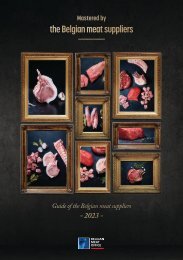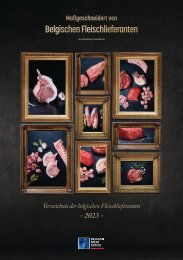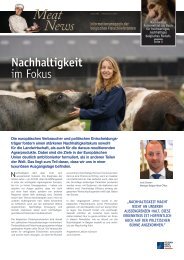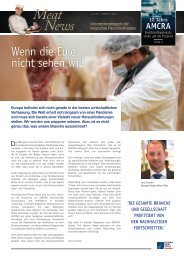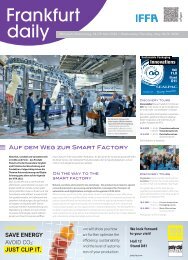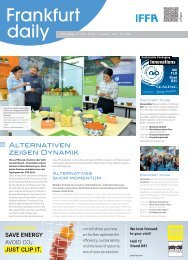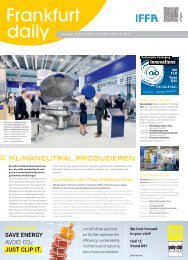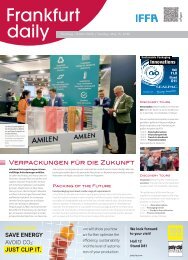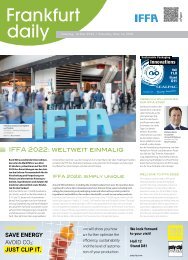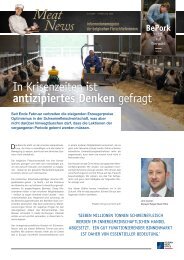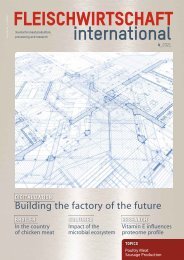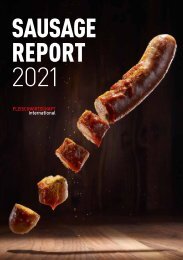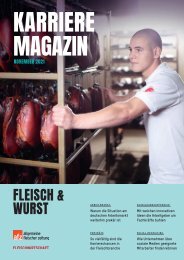FLEISCHWIRTSCHAFT international 1/2017
Create successful ePaper yourself
Turn your PDF publications into a flip-book with our unique Google optimized e-Paper software.
20<br />
Fleischwirtschaft <strong>international</strong> 1_<strong>2017</strong><br />
Consumer Research<br />
Ardi and Willyvan Erp<br />
with their farm in Sint<br />
Anthonis are<br />
ambassadors of the<br />
image campaign for the<br />
advertising slogan “We<br />
are proud if you buy one<br />
of our chickens”.<br />
Poultry still as popular as ever<br />
Dutch per capita consumption of poultry meat remains constant at ahigh level<br />
Poultry meat consumption now<br />
accounts for around one third of<br />
total meat consumption in the<br />
Netherlands (per capita around<br />
75 kg). This is due not only to the<br />
factthat for manypeoplepoultry<br />
tastes good,that it is easily digestibleand<br />
can be prepared easily<br />
in manydifferent ways. The study<br />
recently presented by the University<br />
of Wageningen on the development<br />
of meat consumption in the years<br />
2005 to 2015 also shows rational<br />
arguments such as the comparatively<br />
small CO2 footprint.The<br />
Association of Dutch Poultry Processing<br />
Industries (Nepluvi) sees<br />
the constantly high level of poultry<br />
meat consumption as confirmation<br />
of the industry’scommitment to<br />
sustainability and viability.<br />
By Gert-Jan Oplaat<br />
On the basis of the study on<br />
meat consumption in the<br />
Netherlands published recently by<br />
the University of Wageningen<br />
from Wageningen, the Netherlands,<br />
Nepluvi can draw agood<br />
balance for the poultry sector.<br />
Although meat consumption in<br />
general has declined in recent<br />
years, the consumption of poultry<br />
meat has continued to rise and<br />
according to thelatest figures has<br />
remained at the high level of<br />
2014.Thus theper capita consumption<br />
of poultry meat in the<br />
Netherlands reached an impressive<br />
22.3 kg in 2015 too and is<br />
accordingly stable against the<br />
trend.<br />
Since 2005 total percapita meat<br />
consumption in general has<br />
dropped by five kg from 80 kg to<br />
75 kg. By contrast, especially in the<br />
years 2005 to 2009, poultry meat<br />
consumption increased strongly<br />
and has remained constant at this<br />
comparatively high level ever<br />
since.<br />
Factors influencing<br />
meat consumption<br />
Thestudy examines the development<br />
of meat consumption by the<br />
Dutch population in the years<br />
2005 to 2015 under various aspects.<br />
Differing attitudes to the<br />
nature and quantity of meat consumption<br />
can be identified over<br />
the years. Alongside changes in<br />
dietary habits targeting ahealthier<br />
or more balanced lifestyle, factors<br />
such as sustainability and animal<br />
welfare are also playing an increasingly<br />
important role, with their<br />
relevance and impactalways depending<br />
on how much meat a<br />
consumer basically consumes.<br />
According to theUniversity of<br />
Wageningen, in the course of recent<br />
years it has become established in<br />
society that lower meat consumption<br />
involves asmaller CO2 footprint.For<br />
some consumers, the<br />
quantity of meat consumed is<br />
directly linked to global warming<br />
(Wageningen Economic Research<br />
Nota 2016-097,9,11).<br />
However,this is not as relevant<br />
for the poultry meat sectorasit is<br />
for other types of meat.Here<br />
poultry meat has an ecological<br />
advantage over pigmeat and beef<br />
above all due to the good feed<br />
conversion ratebythe nature of of<br />
the animals. Furthermore, by<br />
using efficient heat recovery and<br />
heat storage technologies, the<br />
sectorisreducing energy consumption<br />
in poultry-keeping<br />
further.There are already some<br />
energy-neutral farms in the<br />
Netherlands.<br />
Focus on health, welfare<br />
and sustainability<br />
Animal welfare and animal health<br />
also influence the population’s<br />
attitude to their meat consumption.<br />
There are things going on in<br />
the Netherlands in this respect.<br />
Forexample the broiler sectoris<br />
the EU-wide pioneer in reducing<br />
the application of antibiotics. The<br />
use of these medicaments there<br />
has dropped by 71% since 2009. It<br />
is evident from the 2015 annual<br />
report of the Dutch Animal Health<br />
Service (Gezondheidsdienst voor<br />
Dieren, GD) that it has been possible<br />
to reduce their use substantially<br />
there within the last seven years.<br />
This is attributable above all to a<br />
special antibiotic use plan that has<br />
been practiced since 2008.<br />
Thecorresponding measures<br />
and methods are applied directly on


